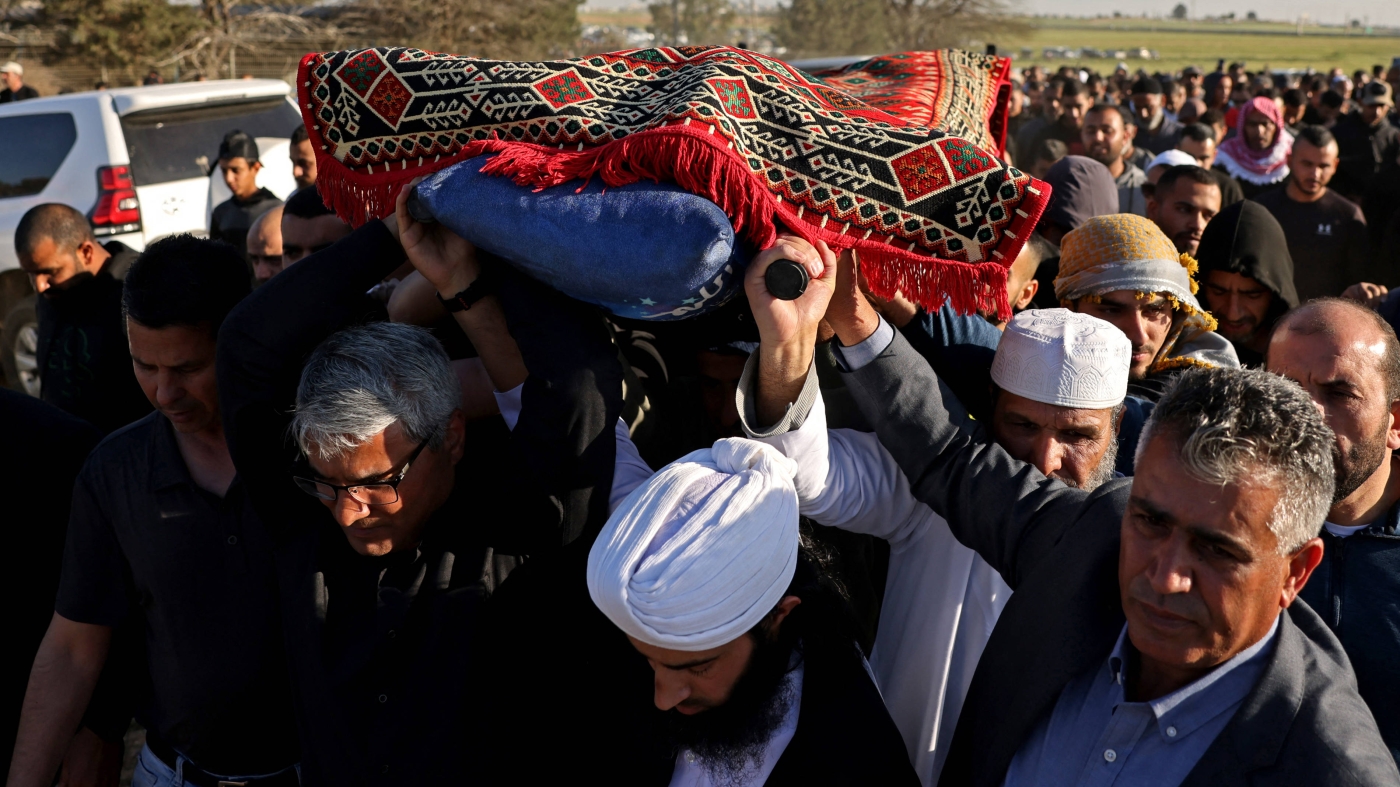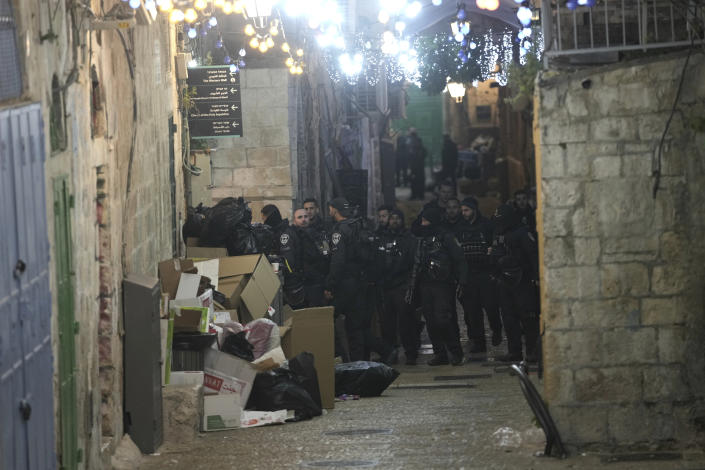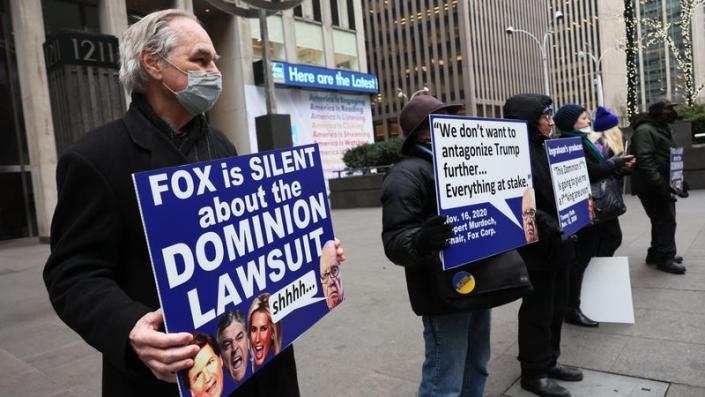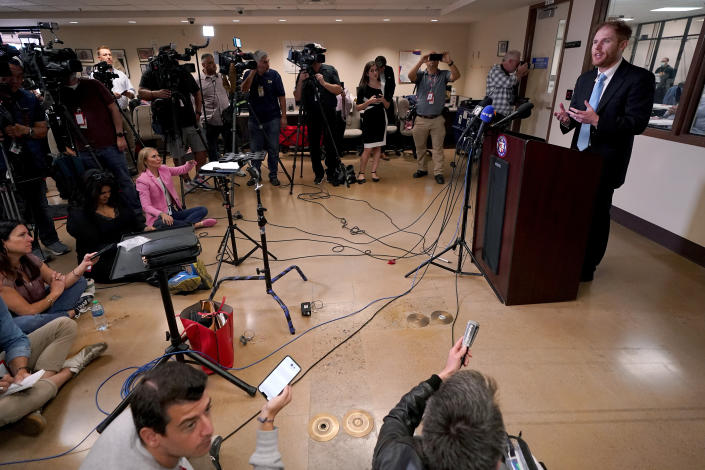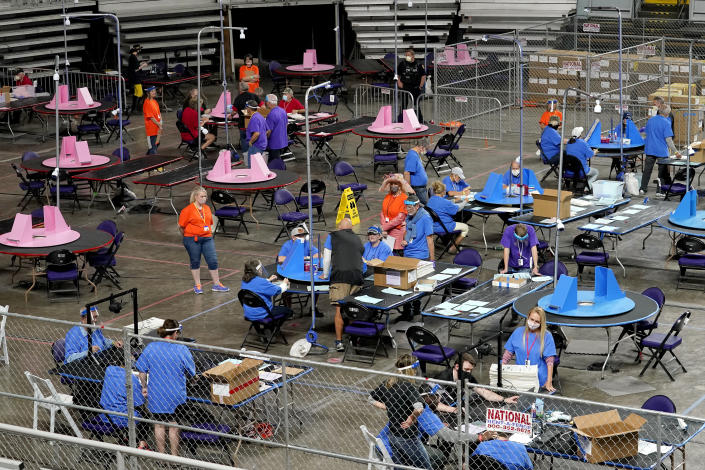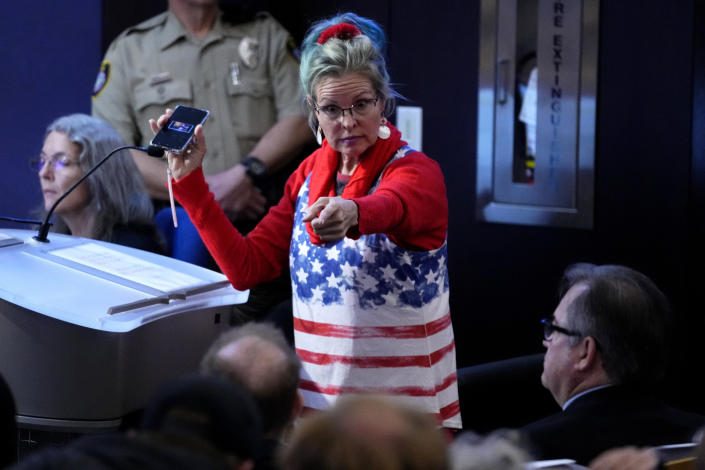Israel approves 'national guard' sought by far-right security minister
Arab politicians have denounced the national guard as a 'militia' for Itamar Ben-Gvir, while some say new force could be used to crack down on protests against the government

Israeli Minister of National Security Itamar Ben-Gvir speaks to the media ahead of the weekly cabinet meeting in the prime minister's office in Jerusalem, 19 March 2023 (AFP)
By MEE and agencies
Published date: 2 April 2023
Israel authorised on Sunday the setting up of a national guard under far-right security minister Itamar Ben-Gvir, who has said it would focus on Arab unrest, while political rivals accused him of setting up a sectarian "militia".
The previous government had begun moves to set up an auxiliary police force to tackle internal political violence following pro-Palestinian protests in mixed Jewish-Arab areas during the Gaza Strip war of May 2021. That government fell before the force was finalised.
The exact powers of the new national guard will be discussed by a committee comprised of all Israeli security agencies, which will submit recommendations within 90 days, the prime minister's office said in a statement.
It was not immediately clear who would have direct authority over the national guard.
Israel's police chief, Inspector-General Yaakov Shabtai, has expressed misgivings about the new force in a letter to Ben-Gvir, local media reported.
Stay informed with MEE's newsletters
Sign up to get the latest alerts, insights and analysis, starting with Turkey Unpacked
Ben-Gvir, a hardline Jewish settler from the occupied West Bank with past convictions for support for terrorism and incitement against Arabs - who make up 21 per cent of Israel's population - rose in politics partly due to the 2021 unrest.
Having moderated some of his positions, he wields an expanded law-and-order portfolio in Prime Minister Benjamin Netanyahu's religious-nationalist governing coalition.
'Militia'
Ben-Gvir has described the planned national guard in media interviews as an update of the previous government's initiative. Discussing its planned deployments, he named only Arab communities hit by riots or crime, in Israel as well as along the boundaries with the Palestinian West Bank.
"It will deal with this exclusively. The police does not deal exclusively with this. It's busy with a thousand and one things," he told Army Radio.
Arab politicians have denounced the national guard as a "militia" for Ben-Gvir. Other opposition figures have accused Ben-Gvir of wanting a new force to crack down on nationwide demonstrations against the government's judicial overhaul plan.
Read More »
"Why does the State of Israel - which has an army, police, military intelligence, the Shin Bet, Mossad, National Security Council, Prisons Service, riot police, a SWAT team - need another national guard?" Arab lawmaker Ayman Odeh wrote on Twitter.
Government funding will enable an initial intake of 1,850 personnel for the new force, Ben-Gvir said, adding that these could be seconded police officers and volunteers, including from the Arab sector.
He said that the national guard would take months to get off the ground and that he was trying to fill police posts in parallel.
Israeli police chief Shabtai questioned the need for the national guard and warned that any separation of it from the police hierarchy "could prove most costly and even harm the security of the citizenry", according to the Ynet news site.
Confirming the existence of the letter, Ben-Gvir said he would meet Shabtai on Monday and was open to the possibility of putting the national guard under the command authority of the police "if they're serious and really want it".
Netanyahu in weak position
The plan was part of a deal between Netanyahu and Ben-Gvir, who had threatened to resign after the prime minister paused a controversial plan to overhaul the judiciary following weeks of mass protests that brought the country to a stand-still on Monday.
Ben-Gvir agreed to the delay in return for allowing the creation of a national guard loyal to his ministry.
"Why does the State of Israel - which has an army, police, military intelligence, the Shin Bet, Mossad, National Security Council, Prisons Service, riot police, a SWAT team - need another national guard?" Arab lawmaker Ayman Odeh wrote on Twitter.
Government funding will enable an initial intake of 1,850 personnel for the new force, Ben-Gvir said, adding that these could be seconded police officers and volunteers, including from the Arab sector.
He said that the national guard would take months to get off the ground and that he was trying to fill police posts in parallel.
Israeli police chief Shabtai questioned the need for the national guard and warned that any separation of it from the police hierarchy "could prove most costly and even harm the security of the citizenry", according to the Ynet news site.
Confirming the existence of the letter, Ben-Gvir said he would meet Shabtai on Monday and was open to the possibility of putting the national guard under the command authority of the police "if they're serious and really want it".
Netanyahu in weak position
The plan was part of a deal between Netanyahu and Ben-Gvir, who had threatened to resign after the prime minister paused a controversial plan to overhaul the judiciary following weeks of mass protests that brought the country to a stand-still on Monday.
Ben-Gvir agreed to the delay in return for allowing the creation of a national guard loyal to his ministry.
'Clearly, Netanyahu’s political standing is extremely weak. His polling numbers are at historic lows, and his own party is extremely resentful of him'- Yonatan Touval, analyst
"Clearly, Netanyahu’s political standing is extremely weak," said Yonatan Touval, an analyst at the Israeli Institute for Regional Foreign Policies (Mitvim), following the decision on the national guard.
"His polling numbers are at historic lows, and his own party is extremely resentful of him," added Touval speaking to Middle East Eye.
Ben-Gvir has long supported the creation of a national guard and wants to "have a paramilitary force directly under his command that he can deploy in mixed Arab-Israeli towns inside Israel," said Touval.
"It goes without saying that the force would focus on enforcing law and order on Arab residents whenever tensions and violence erupt," he added.
Ben-Gvir has already told police to crack down harder on anti-government protests that have rocked the country since January.
'Anti-Palestinian agenda'
The Association for Civil Rights in Israel has said: "We already saw what happened when Ben-Gvir wanted to suppress the protests; now one can only imagine what will happen when he has his own militias."
Palestinian citizens of Israel and those living in the occupied territories are also likely to fear the move, since it could likely be used against them.
"Giving a private militia to Kahanist minister Itamar Ben-Gvir, who is a convicted criminal, is likely to occasion a new low for Palestinian human security across the occupied Palestinian Territories," said Robert Andrews, the public relations officer at the human rights NGO the EuroPal Forum.

Netanyahu has taken Israel to the abyss. What is his exit strategy?
Read More »
Rabbi Meir Kahane was an Israeli-American who led a far-right group that gave rise to Kahanism, an extremist religious Zionist worldview premised on Jewish supremacy.
Ben-Gvir’s Jewish Power party has in the past espoused Kahanist ideology and is an important coalition member in Netanyahu's ruling coalition.
"The decision to award the fascistic Ben-Gvir with a private militia will undoubtedly serve to embolden his clear anti-Palestinian agenda," Andrews told MEE.
In the last few months, Ben-Gvir has already introduced a series of draconian measures against Palestinians.
In February, Israel's parliament passed the first stage of a bill, introduced by the Jewish Power Party, to stop funding non-essential medical treatment for Palestinians in Israeli prisons.
Since joining Netanyahu's government late last year, the security minister has vowed to crack down on the treatment of Palestinian prisoners, whom he claims are being treated too well.
Rabbi Meir Kahane was an Israeli-American who led a far-right group that gave rise to Kahanism, an extremist religious Zionist worldview premised on Jewish supremacy.
Ben-Gvir’s Jewish Power party has in the past espoused Kahanist ideology and is an important coalition member in Netanyahu's ruling coalition.
"The decision to award the fascistic Ben-Gvir with a private militia will undoubtedly serve to embolden his clear anti-Palestinian agenda," Andrews told MEE.
In the last few months, Ben-Gvir has already introduced a series of draconian measures against Palestinians.
In February, Israel's parliament passed the first stage of a bill, introduced by the Jewish Power Party, to stop funding non-essential medical treatment for Palestinians in Israeli prisons.
Since joining Netanyahu's government late last year, the security minister has vowed to crack down on the treatment of Palestinian prisoners, whom he claims are being treated too well.
'Legal challenges'
Ben-Gvir has also ordered the closure of Palestinian prisoner-run bakeries in Israeli prisons and that detainees only be given four minutes to shower.
"With a private militia now under his absolute control, it is already clear - as per his statements thus far - that Ben-Gvir will use the group to further legitimise settler violence against Palestinian communities under the guise of ‘protecting law and order'," said Andrews.
"The Hilltop Youth, [an extremist religious-nationalist settler group], already routinely terrorise and attack Palestinian civilians and property with impunity," he added.
"One can expect Ben-Gvir’s militia to continue the acts of violence and terrorism against Palestinians, albeit while wearing uniforms and officially part of the state’s apparatus."
Despite such fears, Touval said that the decision to form the national guard is likely to be fought in the courts and Ben-Gvir’s control over it is still far from assured.
"The establishment of such a force is likely to meet legal challenges, especially if, as the latest plan states, the national guard is to be separate and independent of the police and subject directly to the Ministry of National Security and its minister, Ben-Gvir himself," said Touval.
Israeli PM Benjamin Netanyahu Promised to Give a Racist Security Minister His Own Government Militia
Lloyd Green
Wed, March 29, 2023
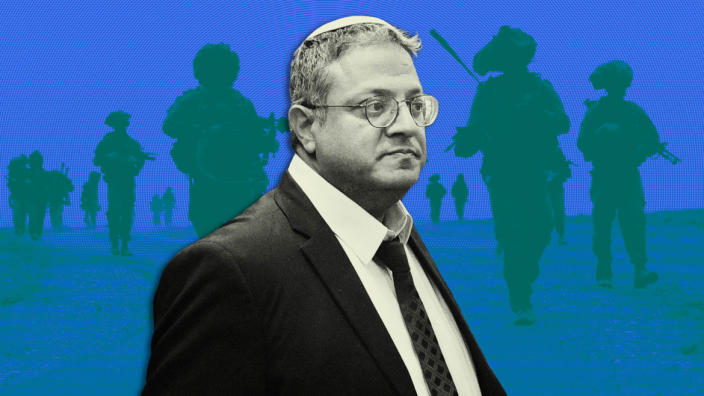
Photo Illustration by Thomas Levinson/The Daily Beast/Reuters
Last November, the far-right neo-Kahanist Itamar Ben-Gvir helped deliver Benjamin Netanyahu’s election victory. Once a fringe fixture of Israel’s radical right, he is now the country’s minister of public security. Unlike the late Meir Kahane, his hero, Ben-Gvir walks the corridors of power. Like Kahane, however, he finds himself at the eye of a continuous political storm.
On Monday, Benjamin Netanyahu, Israel’s prime minister, placed a temporary hold on his bid to degrade the country’s judiciary. To garner Ben-Gvir’s support, Netanyahu made a jarring concession that left critics seething and Ben-Gvir grinning—he would hand control of the National Guard (presently a unit of the Border Patrol) over to the ministry of national security, which is currently run by Ben-Gvir (the Border Patrol would then be subsumed into the reconstituted National Guard).
If Bibi’s Attacks on Democracy Continue, Biden Should Consider Withholding Aid to Israel
That’s a ton of clout for any one person, particularly Ben-Gvir, who decades earlier was declared by Israel’s military as unfit to serve.
In the end, Netanyahu may fail to honor his pledge. Funds might not be allocated. The government might fall. For the moment, however, the prospect of Ben-Gvir at the helm of a state-backed militia sets plenty of nerves on edge.
“It could be very dangerous,” a senior police official told Ha’aretz.
Earlier this week as throngs protested outside the Knesset, the unnamed official pondered whether “the minister would have sent companies from the National Guard to deal with the protesters, it looks bad.” (For the record, Kobi Shabtai, the police commissioner, opposes Ben-Gvir’s bid.)
Ben-Gvir said the Guard would be focused on “extortion in areas with criminal organizations and ‘mixed’ cities,” which The Jerusalem Post said is “a clear implication of focusing on Israeli-Arab crime,” adding, “National guard members would be issued guns and be considered combat police.”
Combat police under the control of a racist security minister, patrolling Arab neighborhoods. What could go wrong?
The specifics of his proposal have yet to be laid out, let alone finalized. But the events of the past few days have stoked fear that a National Guard in Ben-Gvir’s hands would serve as a cross between a personal praetorian and a band of bully-boys.
Remember when Donald Trump told the neofascist Proud Boys to “stand back and stand by”? Well, they ended up being the primary instigators of violence at the Jan. 6 insurrection at the U.S. Capitol.
For all of his talk of law and order, Ben-Gvir also has fans among “La Familia,” a right-wing booster club of Jerusalem’s Beitar soccer team. The group also brings its share of menace and law breaking.
“Ben-Gvir’s militias from La Familia are going wild right now on the streets of Jerusalem. Looking for Arabs to beat up,” Merav Michaeli, the leader of the opposition Labor Party tweeted. Part of the group then beat an Arab cab driver. “There are eggs, there are knives, there are weapons. We are on our way to Jerusalem,” one hooligan bragged on video.
“This is the man that Netanyahu promised to set up for him his own militia with regular salaries at the expense of the state,” she added.
In a letter addressed to Yoav Gallant, the supposedly fired defense minister, Merav Cohen, a member of the opposition Yesh Atid party, urged that he classify La Familia as a terror group. (For the moment, Gallant still appears on the job.)
As Israel approaches its 75th anniversary, it’s worth recalling when David Ben-Gurion, the country’s first prime minister, made clear that the state would alone possess the monopoly on armed violence.
At the outset, the nascent government worked with Menachem Begin—leader of the Irgun Underground, a right-wing paramilitary group that committed numerous deadly bombings in Israel’s infancy—to integrate his troops into the newly formed Israel Defense Forces. In June 1948, Begin inked a formal agreement, but things did not proceed smoothly.
Armed confrontation between the Irgun and the Palmach (an elite force attached to the Haganah, the official pre-state underground) followed in what would become known as the Altalena Affair, an attempt by the Irgun to smuggle weapons. A sunk ship, standoff, deaths, and arrests followed. In September 1948, Begin disbanded the Irgun.
For decades, he then led the parliamentary opposition. Rule of law and democracy mattered. (Begin became prime minister in 1978).
But it wasn’t just the right-wing engaging in violence.
In November 1948, Ben-Gurion ordered the Palmach to be dismantled. Its alumni, “Palmachniks,” included Yitzhak Rabin, a future Labor prime minister, and Yigal Allon, a foreign minister and an interim prime minister.
Current relations between the U.S. grind loudly. On Tuesday, President Joe Biden announced that Netanyahu would not be at the White House anytime soon. The president also stressed that Israel’s favored status is directly tied to its commitment to democracy.
This Is Israel’s Most Dire Week Since the Yom Kippur War
An alarmed Netanyahu pushed back at 1am local time, saying in a series of tweets: “I have known President Biden for over 40 years, and I appreciate his longstanding commitment to Israel. The alliance between Israel and the United States is unbreakable and always overcomes the occasional disagreements between us…Israel is a sovereign country which makes its decisions by the will of its people and not based on pressures from abroad, including from the best of friends.”
Ben-Gvir, for his part, was thoroughly unimpressed. “Israel is an independent country and no longer a star on the U.S. flag,” he remarked.
The Daily Beast.
Lloyd Green
Wed, March 29, 2023

Photo Illustration by Thomas Levinson/The Daily Beast/Reuters
Last November, the far-right neo-Kahanist Itamar Ben-Gvir helped deliver Benjamin Netanyahu’s election victory. Once a fringe fixture of Israel’s radical right, he is now the country’s minister of public security. Unlike the late Meir Kahane, his hero, Ben-Gvir walks the corridors of power. Like Kahane, however, he finds himself at the eye of a continuous political storm.
On Monday, Benjamin Netanyahu, Israel’s prime minister, placed a temporary hold on his bid to degrade the country’s judiciary. To garner Ben-Gvir’s support, Netanyahu made a jarring concession that left critics seething and Ben-Gvir grinning—he would hand control of the National Guard (presently a unit of the Border Patrol) over to the ministry of national security, which is currently run by Ben-Gvir (the Border Patrol would then be subsumed into the reconstituted National Guard).
If Bibi’s Attacks on Democracy Continue, Biden Should Consider Withholding Aid to Israel
That’s a ton of clout for any one person, particularly Ben-Gvir, who decades earlier was declared by Israel’s military as unfit to serve.
In the end, Netanyahu may fail to honor his pledge. Funds might not be allocated. The government might fall. For the moment, however, the prospect of Ben-Gvir at the helm of a state-backed militia sets plenty of nerves on edge.
“It could be very dangerous,” a senior police official told Ha’aretz.
Earlier this week as throngs protested outside the Knesset, the unnamed official pondered whether “the minister would have sent companies from the National Guard to deal with the protesters, it looks bad.” (For the record, Kobi Shabtai, the police commissioner, opposes Ben-Gvir’s bid.)
Ben-Gvir said the Guard would be focused on “extortion in areas with criminal organizations and ‘mixed’ cities,” which The Jerusalem Post said is “a clear implication of focusing on Israeli-Arab crime,” adding, “National guard members would be issued guns and be considered combat police.”
Combat police under the control of a racist security minister, patrolling Arab neighborhoods. What could go wrong?
The specifics of his proposal have yet to be laid out, let alone finalized. But the events of the past few days have stoked fear that a National Guard in Ben-Gvir’s hands would serve as a cross between a personal praetorian and a band of bully-boys.
Remember when Donald Trump told the neofascist Proud Boys to “stand back and stand by”? Well, they ended up being the primary instigators of violence at the Jan. 6 insurrection at the U.S. Capitol.
For all of his talk of law and order, Ben-Gvir also has fans among “La Familia,” a right-wing booster club of Jerusalem’s Beitar soccer team. The group also brings its share of menace and law breaking.
“Ben-Gvir’s militias from La Familia are going wild right now on the streets of Jerusalem. Looking for Arabs to beat up,” Merav Michaeli, the leader of the opposition Labor Party tweeted. Part of the group then beat an Arab cab driver. “There are eggs, there are knives, there are weapons. We are on our way to Jerusalem,” one hooligan bragged on video.
“This is the man that Netanyahu promised to set up for him his own militia with regular salaries at the expense of the state,” she added.
Israelis Are Trying to Save a Democracy That Never Existed
In a letter addressed to Yoav Gallant, the supposedly fired defense minister, Merav Cohen, a member of the opposition Yesh Atid party, urged that he classify La Familia as a terror group. (For the moment, Gallant still appears on the job.)
As Israel approaches its 75th anniversary, it’s worth recalling when David Ben-Gurion, the country’s first prime minister, made clear that the state would alone possess the monopoly on armed violence.
At the outset, the nascent government worked with Menachem Begin—leader of the Irgun Underground, a right-wing paramilitary group that committed numerous deadly bombings in Israel’s infancy—to integrate his troops into the newly formed Israel Defense Forces. In June 1948, Begin inked a formal agreement, but things did not proceed smoothly.
Armed confrontation between the Irgun and the Palmach (an elite force attached to the Haganah, the official pre-state underground) followed in what would become known as the Altalena Affair, an attempt by the Irgun to smuggle weapons. A sunk ship, standoff, deaths, and arrests followed. In September 1948, Begin disbanded the Irgun.
For decades, he then led the parliamentary opposition. Rule of law and democracy mattered. (Begin became prime minister in 1978).
But it wasn’t just the right-wing engaging in violence.
In November 1948, Ben-Gurion ordered the Palmach to be dismantled. Its alumni, “Palmachniks,” included Yitzhak Rabin, a future Labor prime minister, and Yigal Allon, a foreign minister and an interim prime minister.
Current relations between the U.S. grind loudly. On Tuesday, President Joe Biden announced that Netanyahu would not be at the White House anytime soon. The president also stressed that Israel’s favored status is directly tied to its commitment to democracy.
This Is Israel’s Most Dire Week Since the Yom Kippur War
An alarmed Netanyahu pushed back at 1am local time, saying in a series of tweets: “I have known President Biden for over 40 years, and I appreciate his longstanding commitment to Israel. The alliance between Israel and the United States is unbreakable and always overcomes the occasional disagreements between us…Israel is a sovereign country which makes its decisions by the will of its people and not based on pressures from abroad, including from the best of friends.”
Ben-Gvir, for his part, was thoroughly unimpressed. “Israel is an independent country and no longer a star on the U.S. flag,” he remarked.
The Daily Beast.

